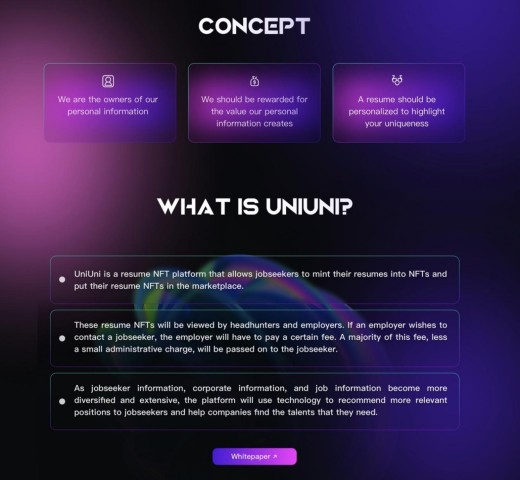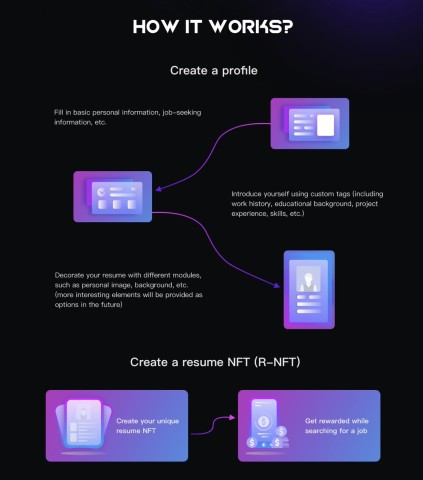Recently, UniUni, a decentralized recruitment platform based on Web3.0, announced that it had received two million dollars from Md5 Capital. Uni enters the global job market, minting a Metaverse resume NFT for each user. When users change jobs, the profits generated by the circulation of Metaverse resumes are owned by users, which is a subversion of the recruitment method of web2.0. Now, there are not many projects in this area, and the most famous one is Braintrust.
UniUni’s model introduction

UniUni and Braintrust have many similarities. For example, they are both decentralized recruitment platforms based on Web3.0. Their early target groups are similar, but after further comparison, the models of UniUni and Braintrust are completely different:
1. Different market orientation:
Braintrust is mainly aimed at freelancers, and most of the work is carried out in the form of projects.
UniUni did not focus on the project platform for freelancers, but guessed that most of them were full-time workers.
2. Different business models:
Braintrust is an independent recruitment platform. It not only has to be decentralized, but also charges intermediary agencies (headhunters), because the platform has to pay the full chain services of headhunters according to the value of the work contract, including job posting, resume screening, salary matching, invoicing and so on. The advantage is high transaction income, while the disadvantage is single service mode and slow development.
UniUni is a decentralized platform, rather than disintermediation. It encourages headhunters to participate in talent recruitment, and charges a certain commission by renting resumes to headhunters. Its advantages are simple mode and rapid business expansion.

UniUni provides customers with a comprehensive solution to cast their resumes into digital assets. Users can not only work UniUni platform, but also earn profits by minting Metaverse Resume NFT, which is the biggest highlight of this model.
Changes in the Web2 recruitment industry
As a traditional but long-lasting industry, recruitment has many innovators and subversives. In the era of Web1.0, ChinaHR, Zhilian and 51job have become the three giants of online recruitment in China. In the era of Web2.0, Lagou opened its popularity by focusing on job recruitment on the Internet, Maimai’s exploration of workplace socialization attracted a lot of traffic, and Boss Zhipin was successfully listed with the help of mobile Internet dividends.
Every technological change will bring in new industries, wealth and talents, and every technological change will make the recruitment industry undergo earth-shaking changes. Although there is no clear answer yet, a change is quietly unfolding:
1. Web2 recruitment platform can provide information matching for job seekers and recruiters, which is a win-win relationship, but once the third-party platform develops and grows, it will generate a driving force, which will damage both job seekers and recruiters. This is the problem repeatedly emphasized in the white paper of Braintrust.
2. Although users can use the services provided by Web2 recruitment platform for free, their core data assets (resumes) are monopolized by the platform. As an important participant and contributor of the ecosystem, their own development will not get any benefits. In the UniUni white paper, the confirmation and value sharing of resume data assets is the main topic.
3. With the continuous breakthrough of Web3.0, the accumulation of personal data in the chain is also increasing. The core function of the recruitment platform is to scan and analyze the data in the chain from a quick and accurate talent-position match?
UniUni project outlook
At this stage, the mainstream of Web3 is still games, Defi and NFT, and O2O such as e-commerce, take-out, and taxis in Web2 are rare, mainly because of the following three points:
1. Although Web3 has achieved decentralization and brought benefits to the community, it has not made great progress in the efficiency of O2O business itself.
2. Web3′ s user pool is still very shallow and distributed all over the world. O2O business must be carried out on the basis of localization, which will reduce the number of Web3 users again.
3. O2O requires a lot of offline business, which is very difficult for the younger generation of Web3 entrepreneurs.
Native Web3 projects, such as Game, Defi and NFT, all developed in the early stage, but the number of users of most Web3 projects will be limited to less than 100,000. The most important reason is that the user pool of Web3 is very shallow. The problem to be solved in Web3′ s entrepreneurial plan is how to introduce Web2 users into Web3.
Recruitment is an intermediate link between Web3 native project and Web2 O2O project, although recruitment service requires enterprises to not only connect employers with employees, but also form a closed loop with all information and transactions online.

Although the recruitment industry is a two-way market, whoever has more resumes will be the ultimate winner. UniUni focuses on resume minting, while token economy attracts more users. UniUni hasn’t issued its own token yet, but announced that it will open the channel of mint Metaverse Resume R-NFT on September 16th. According to the official introduction, UniUni Genesis Avatar will bind the platform rights, and the earlier it is used, the more special benefits it will get. In the long run, as an important part of digital identification system, resume information tends to develop into personal business card and digital identity.
Data source:
uniuni.io
twitter@OfficialUniuni

